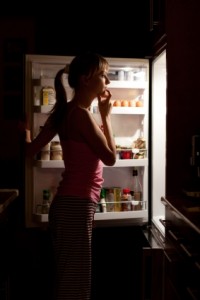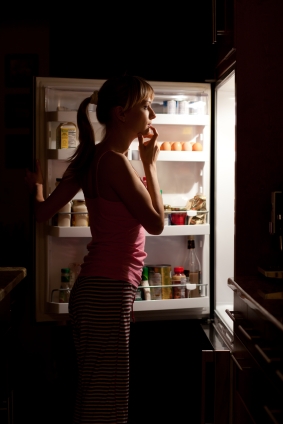 Good quality sleep is vital for our immune system and general well-being. Insomnia or disturbed sleep can leave you feeling unable to get through the day. For occasional sufferers this can be a mild irritation, and for those frequently not meeting their sleep quota it has a long-term negative impact on physical and mental health.
Good quality sleep is vital for our immune system and general well-being. Insomnia or disturbed sleep can leave you feeling unable to get through the day. For occasional sufferers this can be a mild irritation, and for those frequently not meeting their sleep quota it has a long-term negative impact on physical and mental health.
After a good night’s sleep you should wake-up feeling refreshed. However, many people are unaware that what they are eating before bedtime could be sabotaging their revitalizing sleep.
When we sleep several physiological changes occur in our body: our blood pressure and temperature both drop and our breathing and heart rate slow down. During this time of reduced activity the body performs many restorative and repair functions.
The brain re-stocks the various neurotransmitters it has used up during the day and the immune system has its nightly clean up. New cells are made, old ones are removed and generally the body uses this time to look after itself.
Without this time to calm down and make necessary repairs the body will gradually become more susceptible to illness and we will experience reduced mental clarity. If you have ever had to get up repeatedly in the night to look after a new baby you will understand the fogginess and confusion the next day brings.
There are two main types, or stages, of sleep: lighter sleep when we dream and heavier or deeper sleep. It is important to reach these deeper stages of sleep, which occur later in the sleep cycle. If you only achieve the lighter stages of sleep, for example if you wake up repeatedly during the night, you won’t feel refreshed in the morning. Nightmares can also cause us to wake up unnecessarily in states of panic and confusion often with a racing heart, preparing the body for real life battles with imaginary demons.
The process of digestion is generally considered an active process, requiring the body to use energy to break down the food and move it through the body. While some foods may make you feel sleepy, especially high carbohydrate foods, they actually prevent the body from slowing down and getting ready to enjoy its nightly rest.Generally you should avoid eating a few hours before bedtime, to allow your body to finish the more active parts of the digestive process. However, there are a few foods you should specifically avoid if you want to get a restful and reviving sleep.
1. Spicy foods
Many spicy foods increase stomach acid secretion which means if you have over eaten, or have a weak stomach valve, this acid can travel up the esophagus when you lie down. Also known as heartburn this causes a painful sensation in the chest which can make it hard to get to sleep. Some spicy Asian foods also naturally contain high amounts of glutamate, which also stimulates the brain causing excitement of neurons and feelings of alertness.
Studies in the international journal of psycho-physiology found that spicy condiments such as tabasco and mustard had anegative effect on sleep. After eating these hot foods subjects took longer to get to sleep, spent more time awake during the night and less time in the deeper sleep phases.
2. Ice-cream
Well known as a comfort food, ice cream contains large amounts of dairy, fat and also sugar. The high dose of sugar causes the secretion of large amounts of insulin which after it quickly mops up all that sugar will actually make you feel hungry again. This returning hunger, in addition to making you likely to finish the tub of ice-cream, will make you feel famished when trying to get to sleep. Trying to get to sleep after hunger has set in can be difficult and getting up in the night to satisfy your hunger can be disastrous. Developing habits of getting up to eat confuses your biological rhythms and sets in place negative behaviors which can be hard to break.
3. Candy bars
Just like ice-cream, candy bars are packed full of sugar which in addition to adversely affecting the regulation of appetite also correlates to an increased incidence of nightmares. Studies in the Journal of Mind and Body found that consuming sugar laden foods produced nightmares in 70% of their subjects. This was thought to be related to stimulation of specific brain waves related to negative imagery during sleep. Bars also commonly contain chocolate which has its own sleep averting effects.
4. Red meat
While red meat does contain some sleep inducing amino acids, such as tryptophan, it also is very heavy on the stomach and takes a long time to digest. When the body is busy processing all the fats and protein it is hard for it to fully relax and let you drift off to sleep.
The quality of the meat can also have a significant effect. When animals are stressed before they die, either long-term stress due to poor conditions or the short-term stressed induced by the slaughter process, they release cortisol. When we consume their meat we also then take up this hormone and research indicates that when eaten it has a similar effect to when we make it ourselves. Cortisol is better known as the stress hormone and stress is not good for sleep.
5. Greasy food
Food containing lots of fat is renowned for causing stomach upsets which reduce physical comfort and distract you from getting to sleep. Eating late at night also means your body won’t burn off the calories you consume, so they will become stored somewhere on your body as fat. Avoid the sickly feeling before going to bed by staying away from high fat foods.
6. Pizza
Depending on who made it, pizza can be packed full of artificial chemicals designed to make you eat more. While home-made pizza could be a gentle light meal chances are if it is from a fast food restaurant it will contain some form of stimulating glutamate which will make you overindulge. The acidity of the tomato sauce combined with greasy toppings makes this an ‘ideal’ stomach ache inducing sleep preventing snack!
7. Celery
Having to get up in the night is obviously going to prevent you from getting the full spectrum of sleep needed. Celery is a natural diuretic, which means it will make you urinate more often. If you eat celery before going to bed you may need to get up during the night to go to the toilet, when your body would rather be sleeping. Also the high fiber content can make digestion slow and in some people causes bloating, burping and flatulence which add further sleep distractions.
8. Soda
Carbonated drinks either contain sugar or artificial sweeteners, both of which dampen the immune system, which has valuable repair work to do at night. Some sweeteners also excite parts of the brain that should be calming down and preparing to rest. The acidity of the drink also has a negative effect on the stomach and the gas can cause bloating. To top it off many drinks contain caffeine or other stimulants which further reduce your ability to wind down and go to sleep. Since soda contains no nutrient value you may as well avoid it completely, thus also reducing the changes you will have to get up in the night to go to the toilet to flush out its useless chemicals.
Studies conducted by the US military found, perhaps unsurprisingly, that soldiers were having trouble sleeping after consuming energy drinks. While caffeine was one of the main culprits the other ingredients such as herbal stimulants also prevented them getting to sleep even when physically exhausted.
9. Chocolate
While many people are aware tea and coffee contain caffeine, with its known stimulating effect, many people are unaware of less well known sources. Studies undertaken by the Journal of Nutrition Research found that adolescents in particular were often consuming a lot of caffeine from chocolate without realizing.
In addition to the caffeine content chocolate also contains theobromine which has a positive effect on mood and also energy. The combination of the two chemicals can keep your energy levels artificially elevated, making sleep less likely. Studies in the Journal of Sleep Medicine even suggested there could be a correlation between sleep behavior disorders, such as violent dreams, and late night chocolate consumption.
10. Alcohol
While alcohol can help you get to sleep quickly initially, it severely impacts sleep quality. When drinking alcohol you are more likely to wake up during the night and find it difficult to get back to sleep. This means you miss out of the deeper, higher quality, sleep. The immune suppressing effects of alcohol also mean the overnight fix-up of the body physically, and recharging of mental batteries is not done. The physical relaxation of the muscles of the throat also makes snoring more likely which if severe can wake you up, or at least negatively impact the sleep of anybody you are sharing a bed with.
Increase your energy with sleeping not eating
The relationship between food and energy means that when we are over-tired, lacking mental or physical energy, many people reach for high calorie food. This tendency to seek out food is due to the stimulation of the hormone ghrelin and instead of sleeping we eat. Not only does this cause weight gain, but also deprives the body of vital and nourishing sleep. When animals are deprived of sleep in laboratory tests they over-eat to try and compensate, and so do we, but in the long run it doesn’t help.
The increase in incidence of sleep disturbances was previously thought to be related to visual and auditory stimulation before bedtime, specifically TV, and also stress. However research is showing that what we eat can stop us from having a sound night’s sleep. If you are having trouble sleeping try changing your diet and avoid eating for at least a few hours before bedtime. Along with adopting a calming bedtime routine cutting out the late night food could help you drift into the gentle sleepy slumber your body needs.
Now that you have learned about the 10 worst foods to eat before bed, you might be interested about the 4 foods to never eat for breakfast.
Go to next page to watch the 4 Foods to NEVER eat for Breakfast <<
About the Author:
Emma Deangela is the best selling author of The Alkaline Diet Program and 80/20 Fat Loss. She has helped over tens of thousands of men and women to lose weight and transform their health with sound nutrition advice.
Do you look out for these ingredients in the nutrition label? Which wonderful friends in your life would appreciate the 10 worst foods to eat before bed?
Please help them by sharing this eye-opening article with each of them using any of the social media and email buttons below.

Leave a Reply